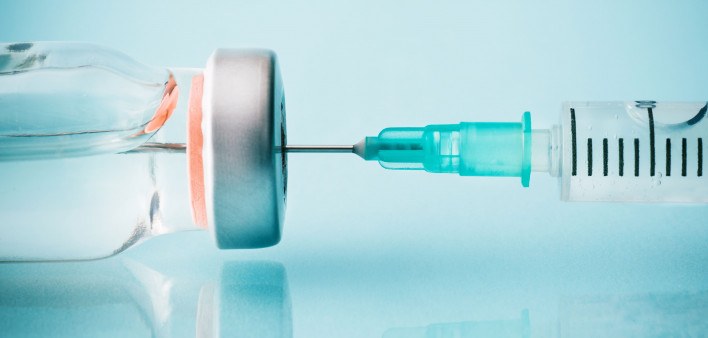People who acquire HIV despite using Apretude (long-acting cabotegravir) for pre-exposure prophylaxis (PrEP) typically have a very low viral load, and infection may not be detected by standard tests for months, according to a study presented at the 30th Conference on Retroviruses and Opportunistic Infections (CROI). The researchers—who dubbed this phenomenon long-acting early viral inhibition syndrome, or LEVI—emphasized that breakthrough infections are rare.
The Food and Drug Administration (FDA) approved Apretude for HIV prevention in December 2021. The injections are administered every other month by a health care provider. To start, people receive two injections one month apart. If desired, they may take cabotegravir pills (Vocabria) for a month as an oral lead-in before the first injection.
As previously reported, two large clinical trials that enrolled gay and bisexual men and transgender women (HPTN 083 trial) and cisgender women (HPTN 084) showed that Apretude injections every other month provide even greater protection than daily oral tenofovir disoproxil fumarate/emtricitabine (Truvada and generic equivalents).
During follow-up, a small number of people randomly assigned to receive Apretude nevertheless acquired HIV. Susan Eshleman, MD, PhD, of Johns Hopkins School of Medicine, and colleagues sought to better characterize early HIV infection among people who received the injections in HPTN 083. (A handful of cases were also seen among women in HPTN 084, but Eshleman did not describe these in her presentation.)
In HPTN 083, a total of 34 out of 2,282 participants randomized to receive Apretude acquired HIV. In most cases (16), the participants had not actually taken the drug within the past six months. In four cases, further analysis showed that they already had HIV at enrollment, but the infection was too recent to detect using standard tests. In eight other cases, people acquired HIV during the oral lead-in period, after a delayed injection or around the time of Apretude reinitiation after PrEP interruption. This left six people who acquired the virus despite on-time injections and apparently adequate drug levels.
In about half the cases, detection of HIV was delayed, although this was rarely observed when infection occurred more than six months after the last Apretude exposure. In such cases, the presence of the drug in the body appears to keep viral load low enough to delay or diminish the production of HIV antibodies. Thus, rapid HIV tests and antibody/antigen tests may not read as positive, and in some cases, seroreversion (testing negative after testing positive) was observed. People with LEVI syndrome had a low or undetectable HIV RNA viral load using standard tests, and HIV DNA was also low or undetectable in some cases, suggesting that establishment of a viral reservoir may be limited.
Viral suppression and delayed or reduced antibody expression can persist for months, even after Apretude injections are discontinued, Eshleman reported. One individual had more than 50 tests using a variety of assays, in an effort to determine whether he was actually infected, but only 15 returned positive results.
Had an amazing time at #CROI2023! We were able to share our real world case of breakthrough HIV-1 infection in the setting of on-time, appropriately monitored CAB-LA for PrEP @howardbrownhc.
— Anu Hazra (@AnuHazraMD) February 22, 2023
We greatly appreciated the insightful discussions which I’ll try to summarize below. pic.twitter.com/iLI7WtJSMj
Although such cases are rare, the absolute number is likely to rise as injectable PrEP is more widely adopted. In a poster presented at the conference, Anu Hazra, MD, of Howard Brown Heath in Chicago, and colleagues described what they believe is the first case of a breakthrough HIV infection in a person who received on-time Apretude injections outside of a clinical trial.
Infection that occurs within six months of Apretude exposure is distinct from normal acute HIV infection, Eshleman explained. The former is characterized by “smoldering” viral replication while the latter is marked by “explosive” replication. Unlike new infection, which often has symptoms such as fever, night sweats, fatigue, muscle aches and swollen glands, LEVI infection typically has few or no symptoms. While HIV transmission is likely during acute infection, people with LEVI have a low enough viral load that transmission is unlikely.
The concern with late HIV detection is that antiretroviral treatment will be delayed, and continuing to use Apretude alone without a complete combination regimen can allow the virus to develop resistance to cabotegravir and other integrase inhibitors. Indeed, 10 of the 18 participants who received Apretude within six months of their first positive HIV test developed integrase resistance, but this did not occur when Apretude was administered more than six months before the positive test.
The FDA and the Centers for Disease Control and Prevention recommend using a sensitive HIV RNA test—rather than the standard testing protocol—to screen people using Apretude, as this can detect the virus sooner, often before resistance occurs. Eshleman’s team is now evaluating RNA testing in HPTN 083 and HPTN 084 to determine whether the benefits outweigh the costs. Eshelman noted that future studies will be needed to see whether LEVI syndrome also occurs with other potent long-acting PrEP agents.
Click here for more news about PrEP.
Click here for more reports from CROI 2023.







Comments
Comments